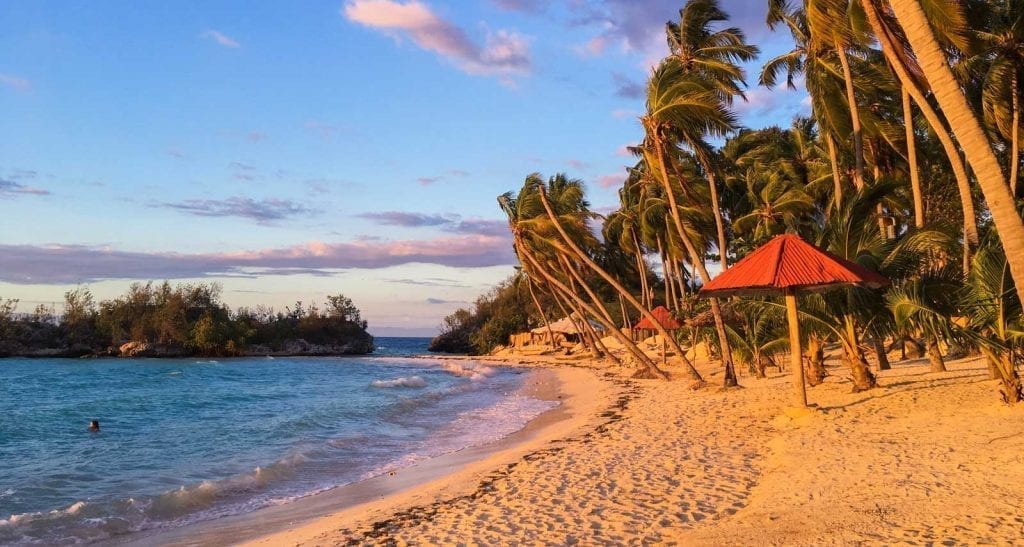Haiti Up Close
From Legba to Erzulie: A Guide to Haitian Vodou Gods & Goddesses
The Vodou spirit Agaou
Photo: Verdy Verna
Unlock the secrets of the deities that govern Haitian Vodou
Share
Enter the mystical world of Haitian Vodou, where powerful gods reign supreme. From the fierce warrior Ogoun to the loving mother Erzulie, practitioners have revered and honored these deities for centuries. But beyond the Hollywood portrayals of zombies and trance possessions, lies a rich cultural heritage steeped in tradition, ritual, and community.
Join us as we go deeper into the fascinating realm of the spirits and discover the true essence of Haitian Vodou.
How many Vodou gods are there in Haitian Vodou?
Actually, there are no gods or goddesses in Vodou. There are no angels or demons, either. Generally, Vodou practitioners agree on the existence of a higher entity. They often call it "Bondye" or "Granmet." Everything that lives and breathes is placed under its supreme authority. But the everyday life and beliefs of the Vodou practitioner are under the aegis of particular entities. These are the Loas.

Rèn Kongo
Photo: Verdy Verna
So what are these Loas?
Think of them as spiritual intermediaries between God and us mortals. The thing is, Vodou practitioners see the Loas as powerful energies that take care of our everyday affairs, while Bondye stays hands-off. Sure, calling Bondye the 'God of Vodou' is a bit of a misnomer, but that doesn't change how important the spirits are in the lives of Vodou practitioners. They're the ones honored during all those ceremonies and rituals you might have heard about.
You won't find a sacred Vodou Bible that lists all the deities because Vodou is a complex and dynamic spirituality. Haitian Vodou's spirits are rooted in African, Caribbean, and indigenous cultures, like those of the Taíno, the Kingdom of Dahomey, and the Congo.
Some practitioners will tell you there are 401 nasyon (families of Loas), and others will mention 101 or 21 nasyon. It's a way of saying there are a lot of Loas out there, known and unknown.
To help make sense of it all, here's a list of the most well-known Loas.
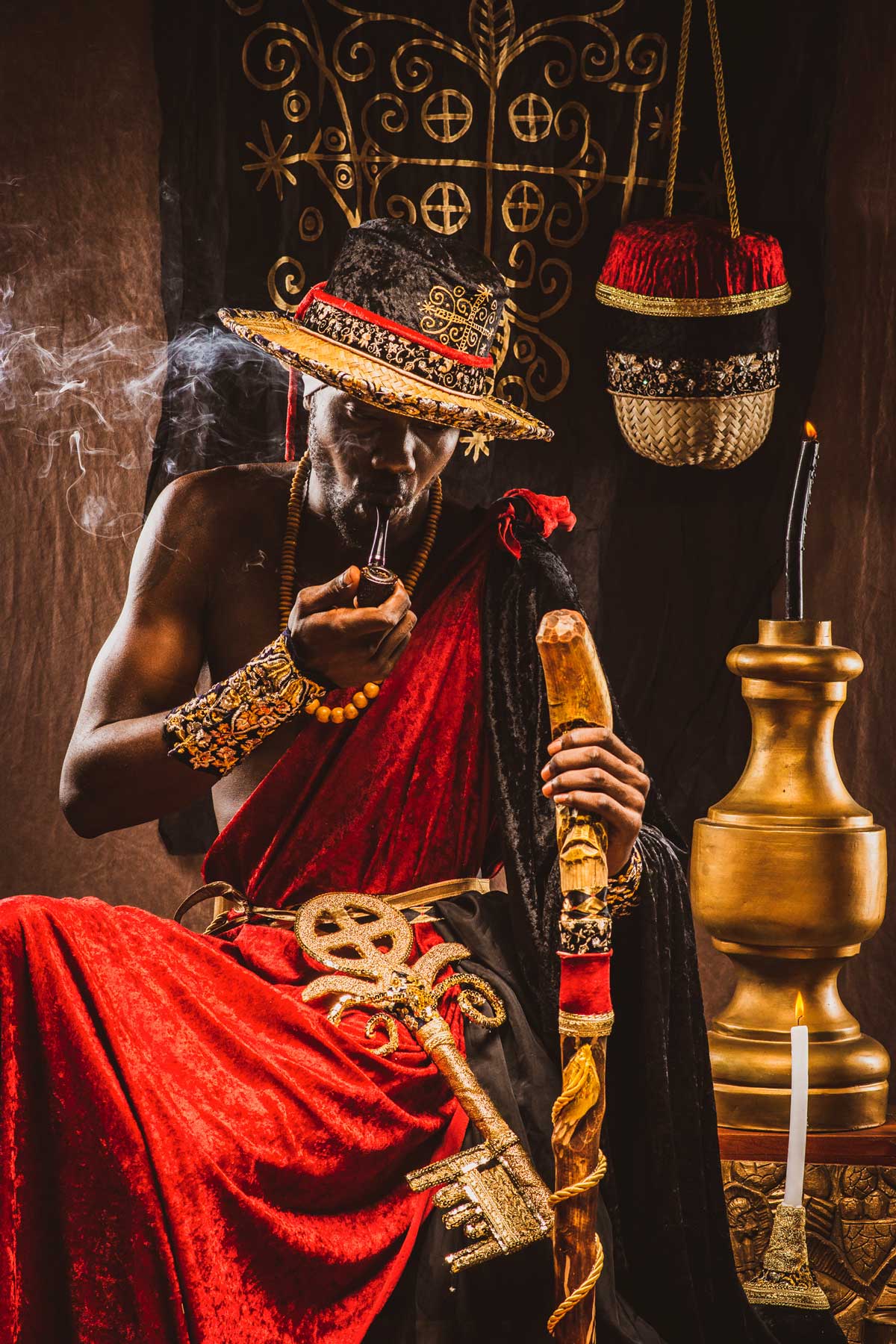
Papa Legba
Photo: Verdy Verna
Papa Legba
Let's start with Papa Legba, the gateway to the spirit world and the one who unlocks the secrets of Vodou. Known as a trickster Loa, he's often portrayed as an older man leaning on a crutch, accompanied by one or more dogs. During Vodou ceremonies, he's the first one to be invoked, as he opens the spiritual gateway that separates the Loas from our physical world.
In addition, Papa Legba is the guardian of portals, doors, and crossroads and is known by many names, such as Atibon Legba, Legba Met Kafou, and Legba Potay. His role is critical in any Vodou ritual, as he's the one who grants access to the other Loas and allows them to manifest themselves during the ceremony.

Danmbala Wèdo & Ayida Wèdo
Photo: Verdy Verna
Damballah Wèdo and Ayida Wèdo
Meet Damballa Wèdo and Ayida Wèdo - the ultimate divine power couple. They symbolize the perfect balance and harmony of all creation, representing both masculine and feminine energies. When together, they're often depicted as two intertwined snakes, showcasing the union of their spirits.
Damballa is the original force of creation, believed to be the inner voice of God. He's the source of all wisdom and knowledge and represents the serpent of the earth and the horizon.
Ayida, on the other hand, is the rainbow, the snake of the sky. She gives rain to the earth and restores its beauty. Together, Damballa and Ayida are the source of life and wisdom. You can often spot their symbol of the intertwined snakes on Vodou drums, furniture, and even the poto mitan (the central pole of a peristyle).
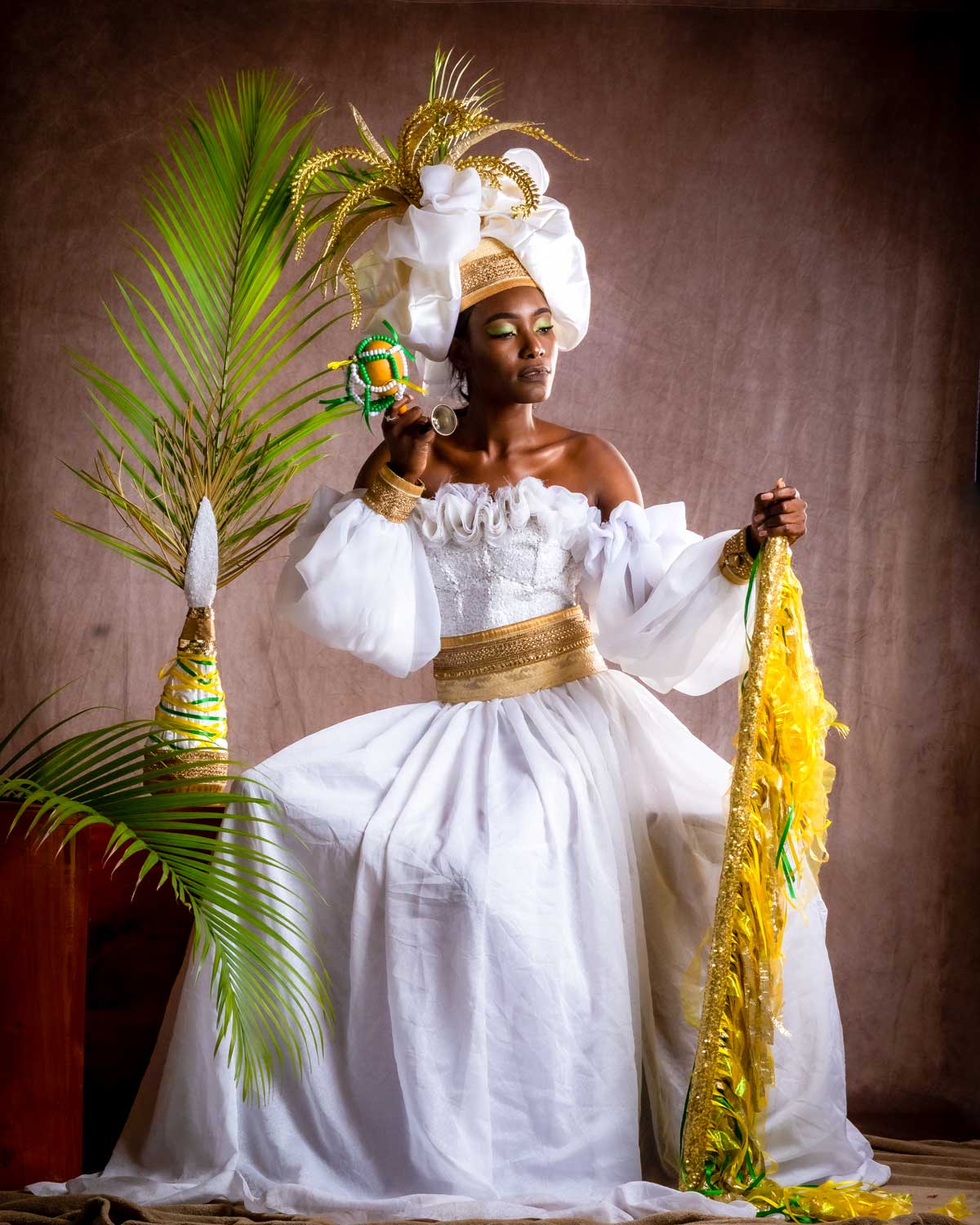
Ayizan Velekete
Photo: Verdy Verna
Ayizan Velekete
A wise old woman who walks the roads with her trusty cane, Ayizan Velekete is more than just a simple figure. She is the guardian of commerce and economy, known for her ancient wisdom and pure spirit. Her benevolent eye watches over business activities and roads, and Vodou practitioners often call upon her for success in their ventures.
As the wife of Papa Loko, they work together to ensure the purity and respect of the Vodou tradition. Her favorite tree is the palm tree, symbolizing royalty, though she is often depicted as a shrewd old woman.
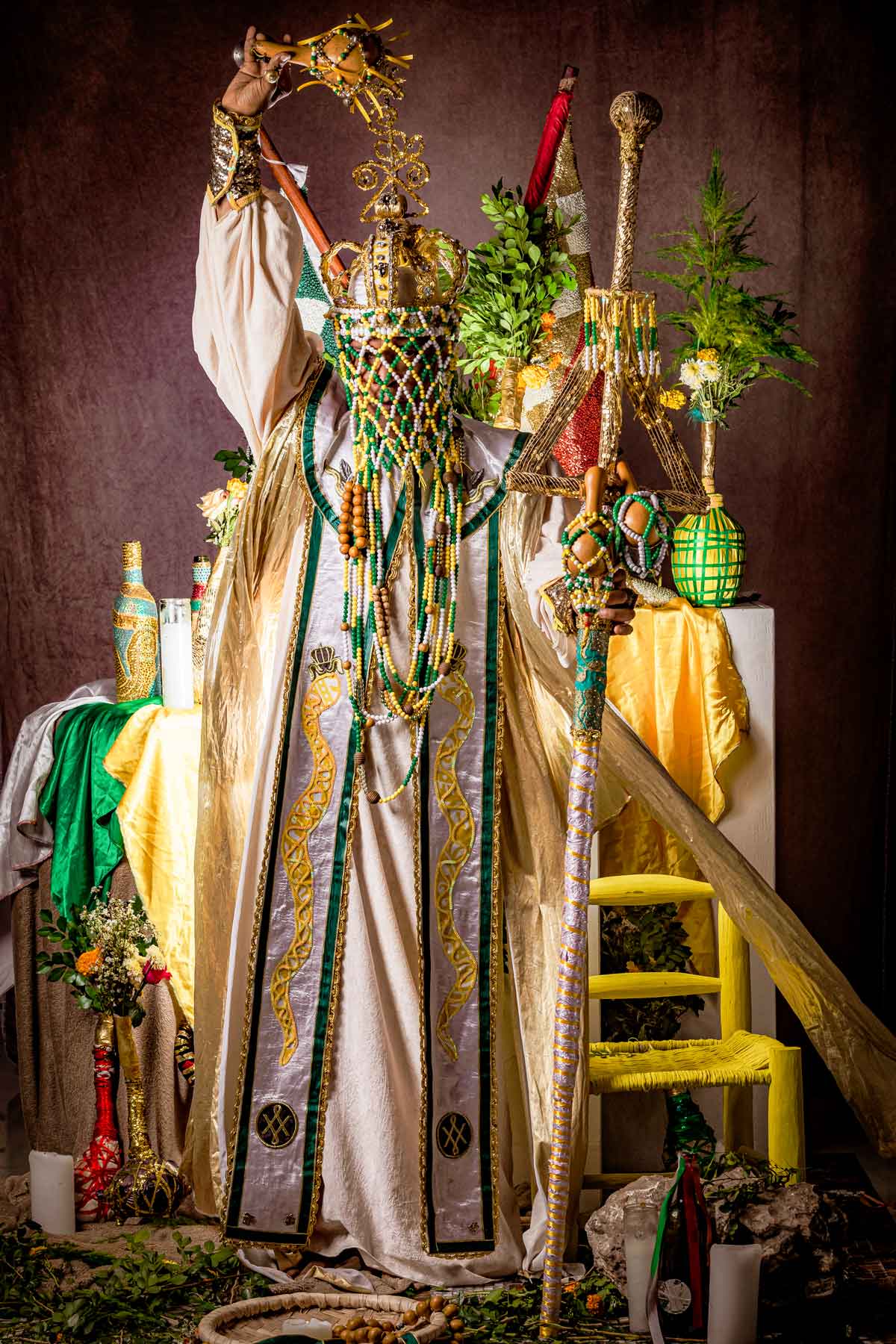
Papa Loko
Photo: Verdy Verna
Papa Loko
Papa Loko is a powerful Loa, and his importance is beautifully illustrated in a popular Haitian folk song famously performed by Toto Bissainthe: "Papa Loko ou se Van, pouse n ale nou se papiyon" (Papa Loko, you’re the wind, pushing us, and we become butterflies).
As the guardian of Vodou temples (known as hounfour), he's responsible for maintaining the Vodou tradition and for passing down wisdom to new initiates in the roles of Vodou priests and priestesses. He's highly respected and often honored by Vodou practitioners who use his asson (rattle) during rituals.
But that's not all - with his extensive knowledge of herbal medicines and natural remedies, Papa Loko is also a healing Loa who can aid those in need of physical, emotional, or spiritual healing.
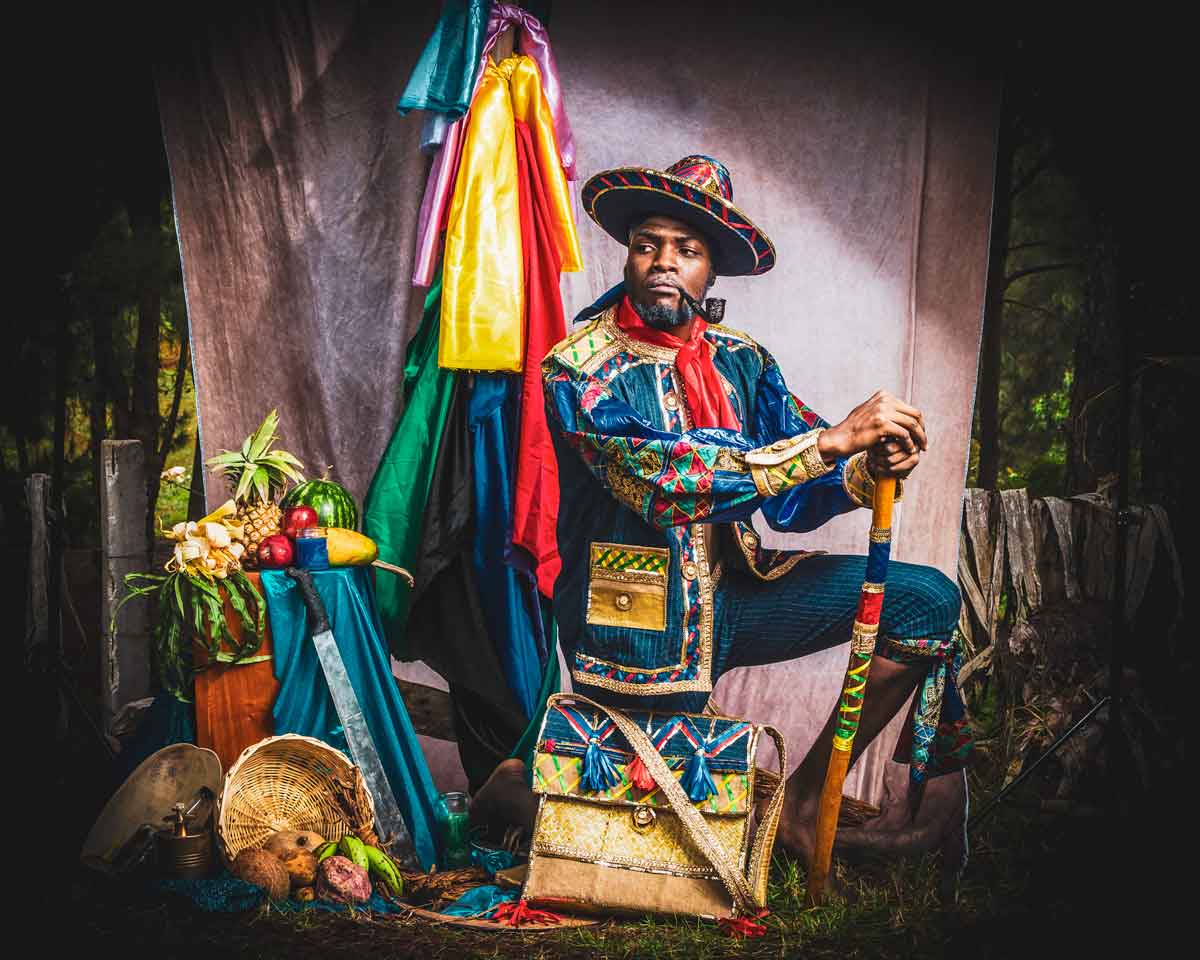
Kouzen Zaka
Photo: Verdy Verna
Kouzen Zaka
Known as the quintessential farmer Loa, Kouzen Zaka is beloved by rural communities for his ability to ensure a bountiful harvest and prosperity in the fields. He's often depicted wearing a straw hat and carrying a machete and a djakout (woven grass bag). Celebrated every May 1st during the feast of agriculture and work, he's known to consume laziness and idleness.
Kouzen Zaka is a friend to hardworking people, granting them success in their labors. He's often associated with Saint Isadore of Seville and loves all Haitians, living or dead. With a childlike version of himself called Ti-Zaka in some lineages, this lovable Loa is all about embracing the power of hard work.
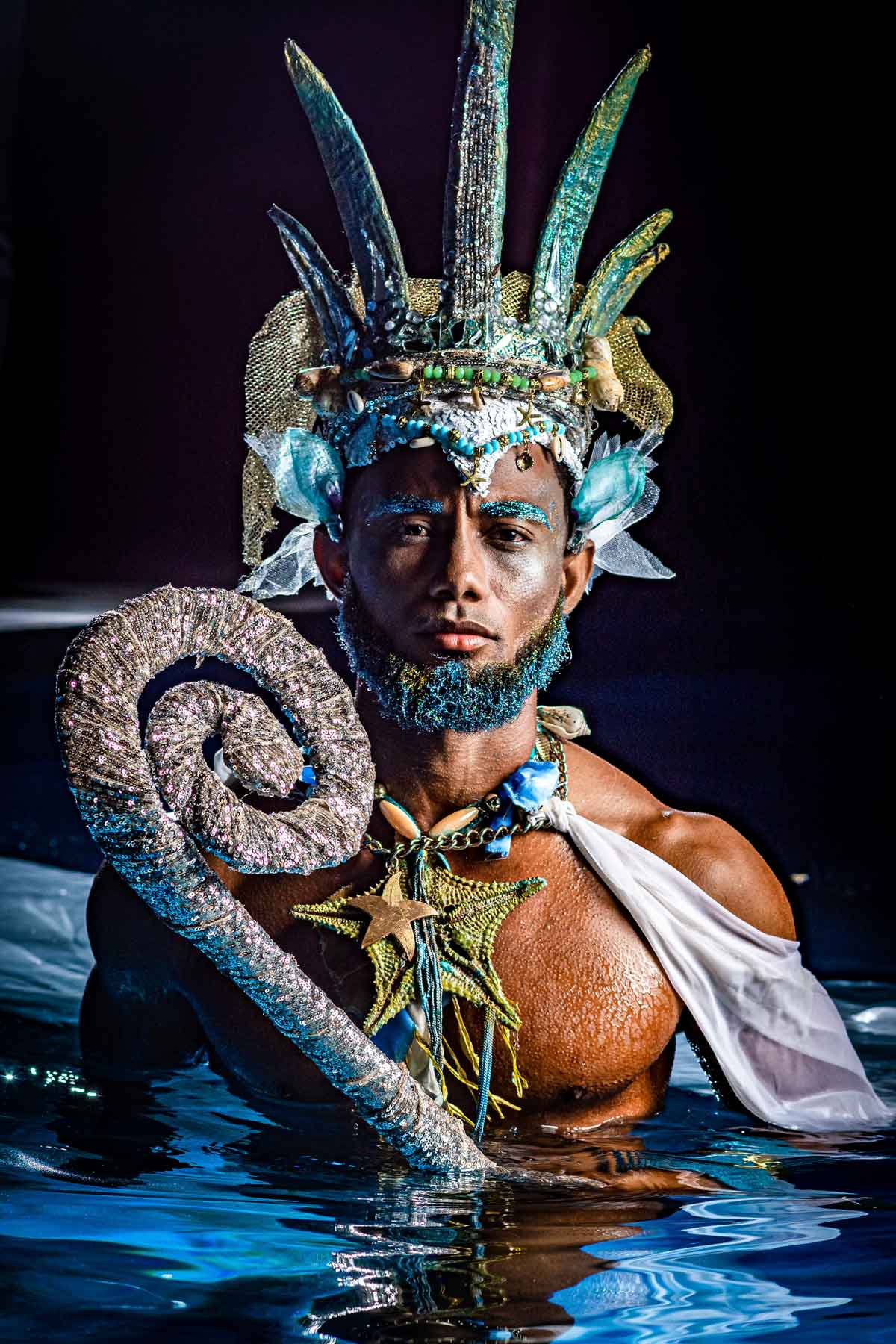
Met Agwe Tawoyo
Photo: Verdy Verna
Met Agwe
A powerful spirit of the oceans, Met Agwe Tawoyo is the ruler and guardian of its bounties. He's often compared to the Greek god Poseidon and is beloved by fishermen and sailors for his generous spirit. His mythical residence, Nan Zile, is said to be hidden deep in the sea's depths.
During Vodou rituals, those possessed by Met Agwe often turn towards the sea, acknowledging his powerful presence. He's married to Mambo La Sirène, the Haitian mermaid, and together they rule over a large group of spirits in the Vodou pantheon.

Manbo Lasirèn Dyaman
Photo: Verdy Verna
Manbo Lasiren Dyaman
In the world of Haitian Vodou, the mermaid goddess of the sea, Lasiren, reigns supreme. With her alluring half-woman, half-fish form, she embodies the wealth and abundance of the ocean and is revered as a powerful Loa who can grant prosperity and good fortune to her followers.
As the wife of Met Agwe, she rules over the vast kingdom of the oceans with him. According to Haitian culture, whoever finds her comb will become the master of immense wealth. But beware - Lasiren isn't just a benevolent spirit. When angered, she can be fickle and dangerous. In her alternate form of Labalenn, the whale, she can manifest as a powerful force of unconscious strength.
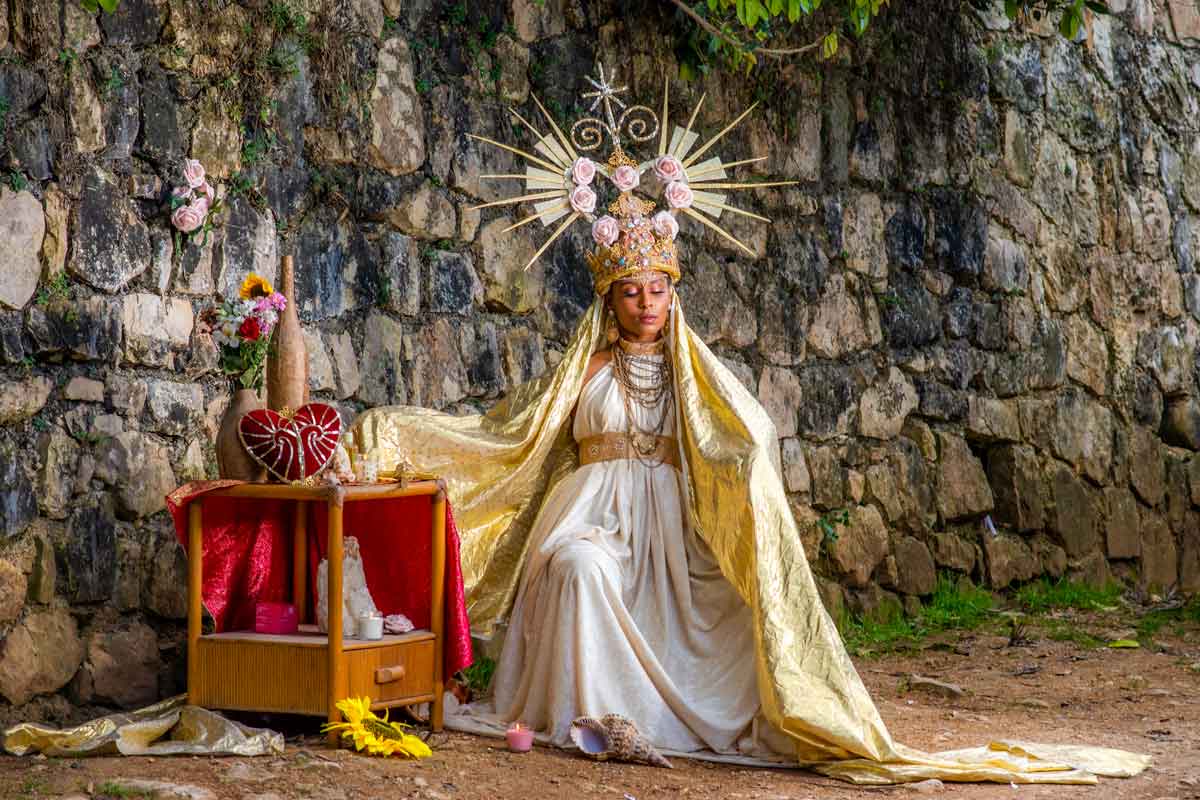
Erzulie Freda
Photo: Verdy Verna
Erzulie Freda
The Haitian Vodou Loa of love, beauty, and prosperity, Erzulie Freda might be compared to the Greek goddess Aphrodite. She is a powerful spirit known for her vanity and timid nature. To receive her as a guest during rituals, practitioners must treat her with honors due to her status as a fine lady. She loves heady perfumes, jewels, and anything related to beauty and coquetry.
She is considered a generous spirit, lavishing her followers with material and spiritual gifts and lots of love, yet she can also be fickle, difficult, and even cruel. Freda is commonly invoked by men seeking sexual prowess or riches and is often assisted by her "sister," the Petwo spirit Ezili Danto.

Erzulie Dantò
Photo: Verdy Verna
Erzulie Dantò
Also known as Mami Dantò, Erzulie Dantò is a powerful and protective mother figure in the Vodou tradition. Often depicted holding a knife, she symbolizes justice and will forcefully fight to protect her children, who are her loyal followers. She is a single mother, a Haitian peasant who is fiercely independent and takes care of her own.
Unlike the Erzulie Freda deity, Dantò does not need frills or coquetry. Instead, she is strong and determined to provide for her children. Despite her harsh appearance, she is deeply caring and dedicated to her children and will stop at nothing to protect them. She is also a guardian and protector of orphans, sick children, and those who have been abused.
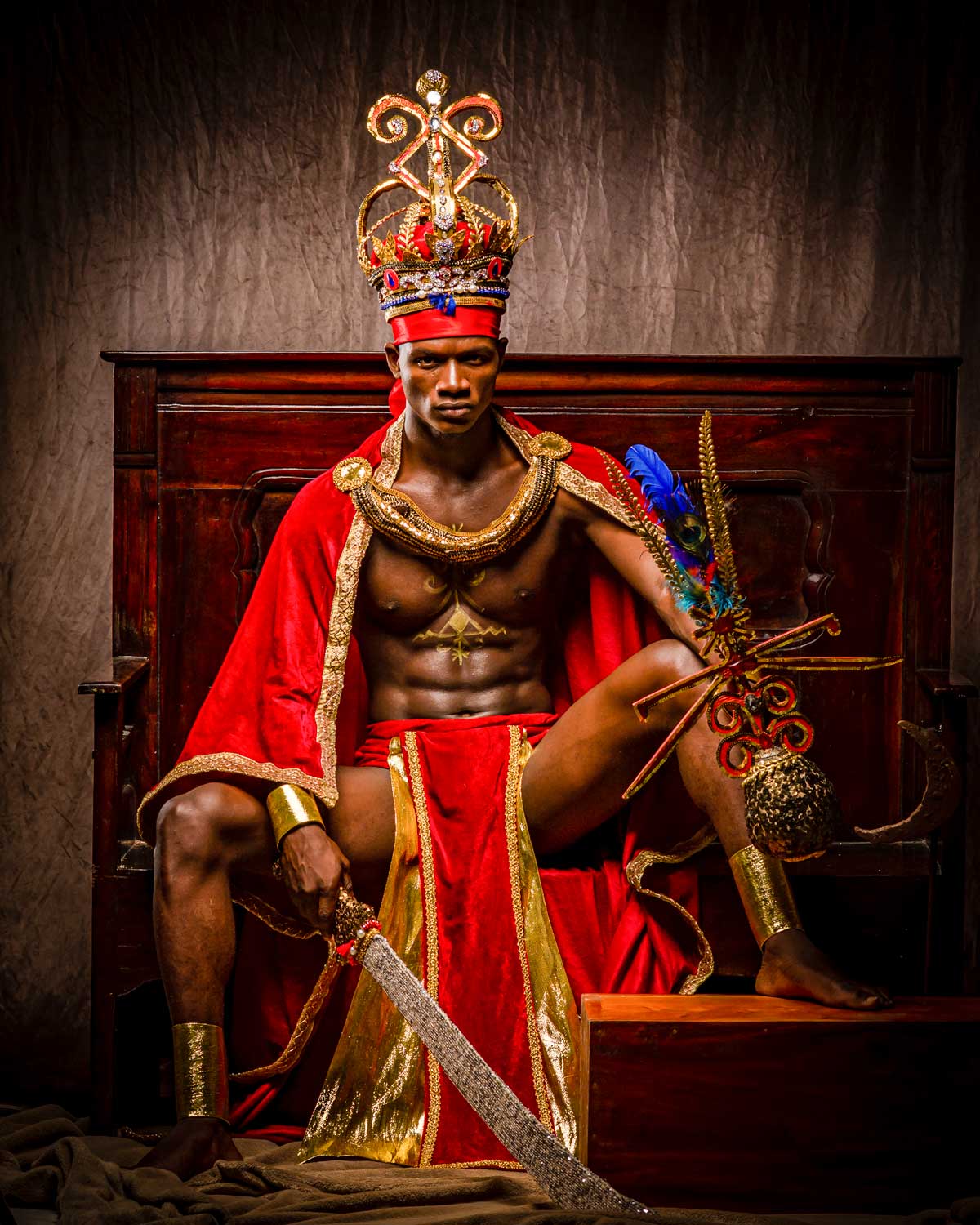
Ogou Feray
Photo: Verdy Verna
Ogou
The mighty warrior Loa of Ogou, is the embodiment of a fighting spirit. Like the Roman war gods Mars and Jupiter, he commands respect and fear from his followers. As the protector and guardian of his people, Ogou is associated with fire, the sword and war.
He is a fierce and formidable deity with multiple forms, including Ogou Feray, Ogou Batala and Ogou Badagri. Each Ogou spirit has distinct characteristics and attributes, but they all share a love for war, the sword, and forge work. With his powerful energy and stern discipline, Ogou is the perfect guide for those seeking to overcome their fears and become stronger, better versions of themselves.
Ogou is said to embody the warrior spirit of the old Oyo Empire in West Africa, and his Vèvè is the totem of the emperors and kings that have followed Abiodun, King of the Oyo people.
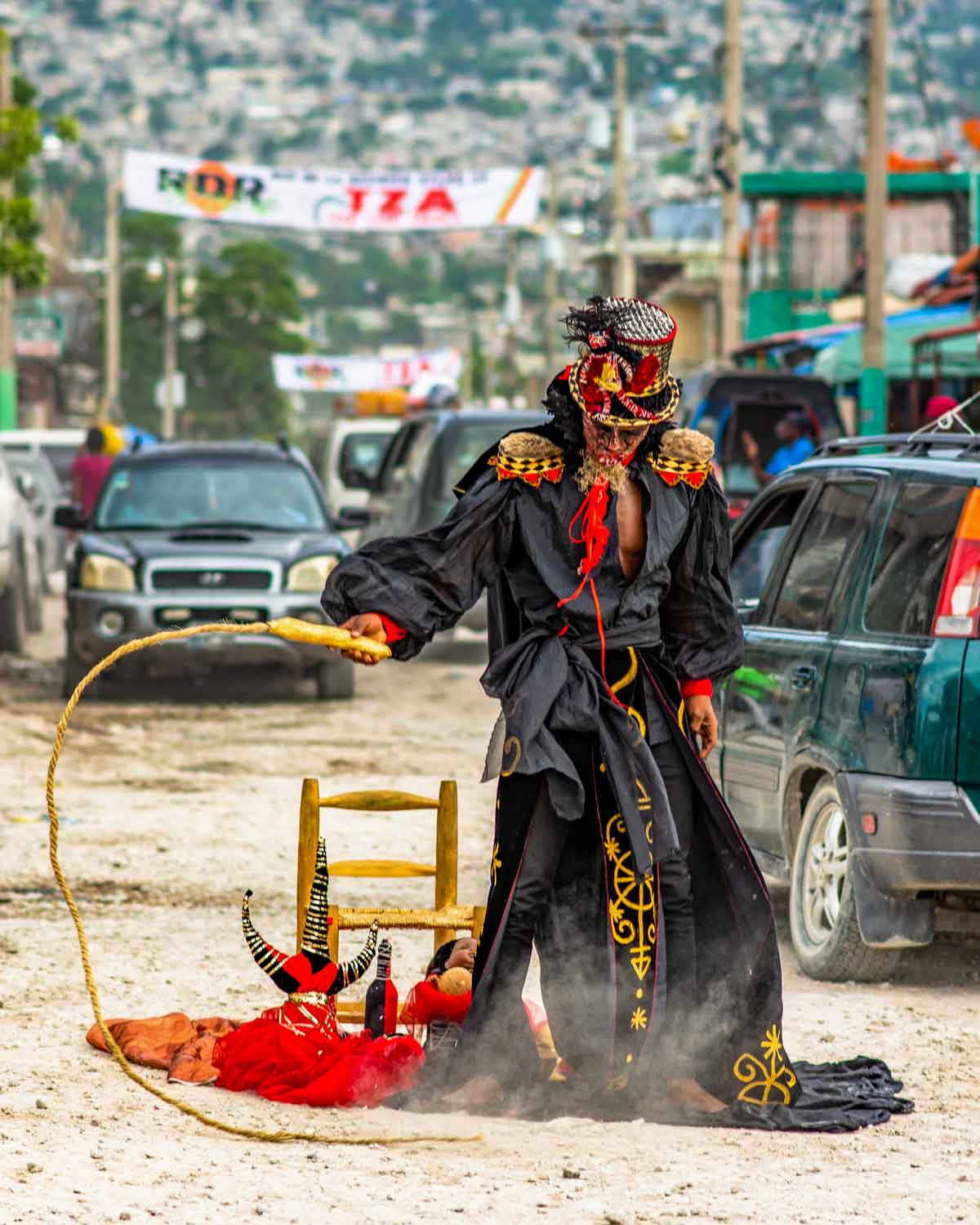
Met Kafou
Photo: Verdy Verna
Met Kafou
If you're brave enough to summon Met Kafou, prepare for a test of willpower, determination, and discipline. This formidable Loa is the master of dark magic and sorcery, and he doesn't grant his favors lightly. However, if you can prove yourself to be worthy, Met Kafou can bestow immense power and knowledge upon you.
But be careful: his gifts come at a steep price, and he won't hesitate to exact it. If you're willing to take the risk, proceed with caution and tread carefully, lest you fall prey to the powerful forces that lie in wait.
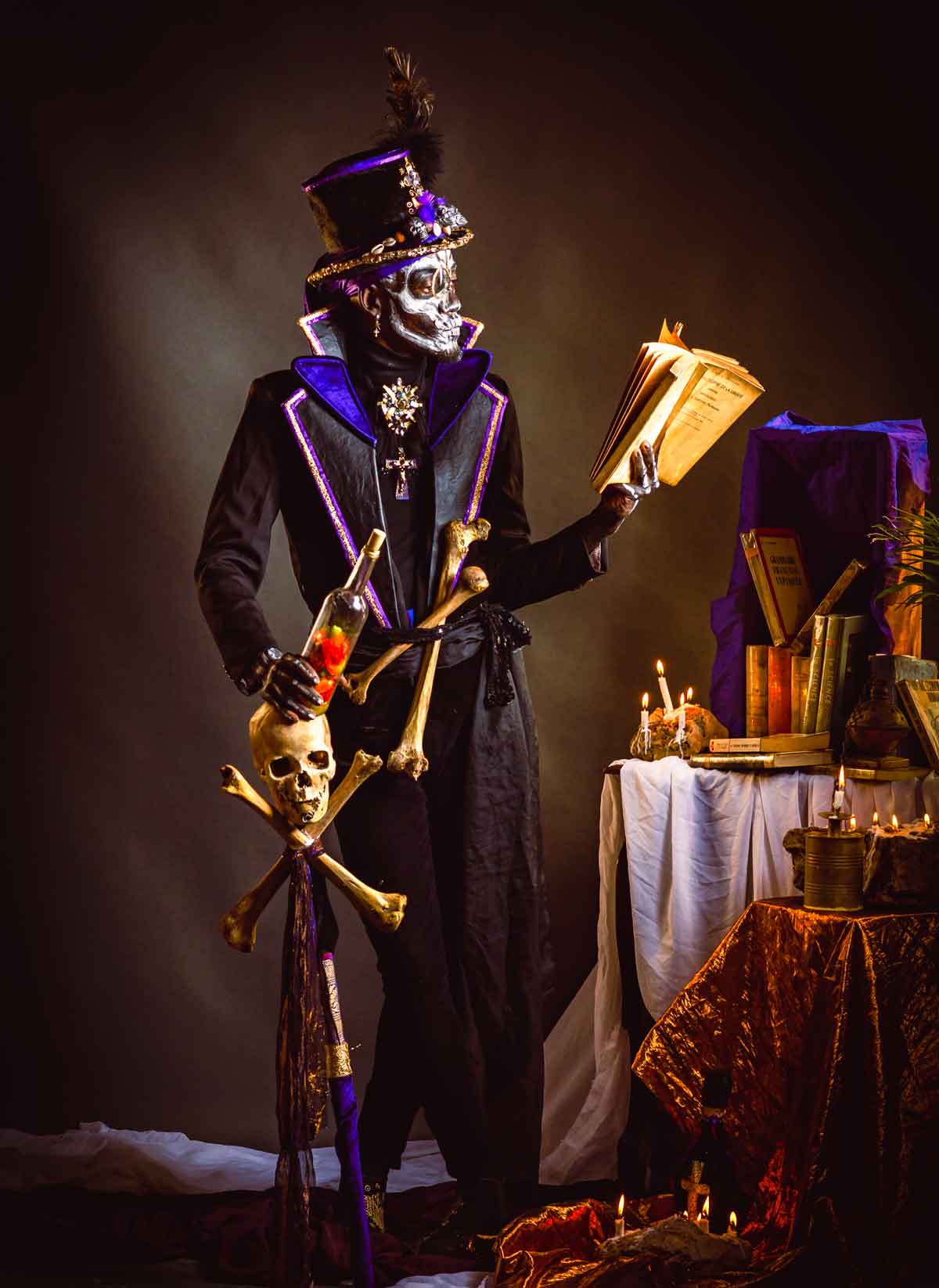
Bawon Samdi
Photo: Verdy Verna
Bawon Samdi and the Gede
Also known as Baron Samedi, is the leader of the Gede Loa group, the spirits of the dead in Vodou tradition. He is the guardian of the barrier between the living and the dead and is responsible for ensuring that the souls of the deceased pass into the afterlife safely.
He is often depicted as a tall, dark figure dressed in a top hat, black tuxedo, and sunglasses, with a skull for a face. Bawon Samdi is known for his mischievous and playful nature, but it should not be taken lightly, as he holds the power of life and death in his hands.
He is often invoked in rituals to communicate with the deceased and is said to be able to heal the sick and protect against evil spirits. The Gede also include other powerful Loas such as Baron Lacroix, Baron Kriminel, Gede Nibo, Papa Gede, and Gede Mazaka, each with their unique personalities and powers.
Learn more about Fèt Gede, the Haitian day of the dead celebration that honors the Gede spirits, and see the photos from a Fèt Gede celebration in Gonaîves.
Written by Costaguinov Baptiste.
Published February 2023.
Explore Haitian Vodou
Photo Journal: Fèt Gede – A celebration of Life on the Day of the Dead
See photos from Fête Gede and take part in the
Eight of the Best Books Written by Haitian Women Authors
We've rounded up eight of the most brilliant books by
A Visual Guide to Vèvè: Vodou Symbols & Cosmograms
Discover the intricate art of Vodou symbols with our visual
11 Haitian Cultural Traditions You Didn’t Know About
Read our guide to unique Haitian cultural traditions that only
The Seven Best Books about Haitian Vodou
Dive into the mystical realm of Haitian Vodou with our
Meet the Colorful Characters From the Jacmel Carnival
Discover the unique universe of costumes at the Jacmel Carnival,
How to Attend a Vodou Ceremony in Haiti
Skulls, sequins and gunpowder smoke - here’s a glimpse inside
Categories
Tags
Share
Subscribe to our newsletter
Get more travel inspiration, tips and exclusive offers sent straight to your inbox

